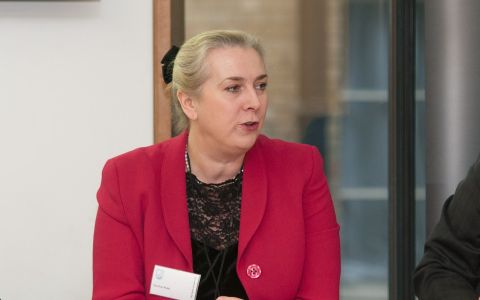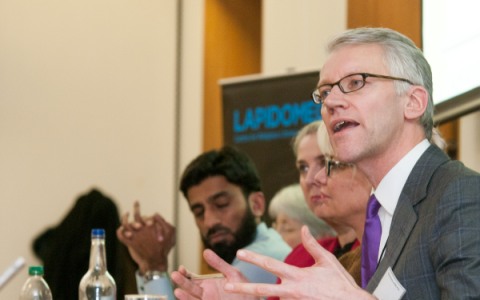Getting Religion: journalists must be ‘braver’ says BBC correspondent
by - 7th January 2015

JOURNALISTS must be ‘braver’ in ‘applying the religious dimension’ to news stories, the BBC’s Religious Affairs Correspondent Caroline Wyatt said yesterday.
The former Defense Correspondent made the remarks after moderating a panel discussion at the Open University’s launch of the Religion, Security and Global Uncertainties report in Portcullis House, Westminster.
Wyatt said journalists are sometimes too ‘timid’ and ‘hesitant’ when dealing with difficult religious issues.
Her comments echoed the report’s call for journalists’ religious literacy to be improved.
Islamophobic
Speaking about her role at the BBC, Wyatt said: ‘We are very keen not to offend, and that sometimes makes us hesitant to do stories where what one interviewee is saying could be, for example, interpreted as being Islamophobic.
‘We’re very worried about upsetting or offending and there are so many stories now which involve extreme interpretation of religion - and not just by groups like ISIS. We need to start being a bit braver in how we think through and apply the religious dimension, and I don’t just say that only because I’m now covering religious affairs.
‘Globalisation has meant that there is a whole world out there to whom religion is very important and for whom secularism or the idea of separation between religion and state is not necessarily something people believe in or want. We need to start getting our minds in the West around how other people think.’
Danger
Dr Jenny Taylor of Lapido Media who organised yesterday’s event, titled ‘Getting Religion – challenging religious Illiteracy in a time of global uncertainty’, said: ‘ignoring religion is anti-journalism’.

‘The majority world is deeply religious. That small bit of it which still dominates the world’s agenda – the secular West – is deeply unaware of what really drives the rest…What people believe matters.
‘The world is in grave danger from the West’s own conceits and complacency,’ she said, but added: ‘If you want to know what a paradigm shift is, we are living through one. We are it. From anti-religion to religious literacy. That is a step in the right direction and we’ve taken another step today.’
Criticism
Award winning historian and classicist Tom Holland who appeared on the panel alongside journalists and academics including Betsy Hiel (Pittsburgh Tribune-Review) and Dr Mustafa Baig (Exeter University) said: 'Religion has been washed out of UK society. We have forgotten the habit and practice of belief.

‘Our government - most of whom are highly educated - got educated in a way that regards religion as something backward and primitive. [They] simply don’t understand what it is that has motivated people.’
Religions themselves are ‘vastly more complicated’ than most people realise, he added, arguing that journalists and politicians often have a ‘default presumption that those who look most Muslim, those who have the longest beards or wear the most impenetrable veils are ipso facto the most Islamic, the most religious'.
ISIS
Speaking about the situation in Iraq and Syria, Holland said: ‘There is no tradition in Islamic scholarship to justify what ISIS are doing but in a sense that is the whole point.
‘What ISIS are doing is to strip away as they see it the padding of tradition and go back to the primal sources to the example of the Prophet and the early Caliphs.
‘When you attempt to go back to an understanding of what happened in the seventh and eighth centuries you can come to almost diametrically opposed conclusions. You can for instance have the form of Islam which is manifest in Islamic State. You can justify if you want to: The slaughter of Yazidis in the name of following the example of the Prophet. You can justify crucifixions and beheadings in reference to the verses in the Koran.
‘You can claim the reason this hasn’t been done before is because people in the Islamic State in the early twenty first century uniquely have managed to see through the fog of Islamic commentary to get back to the primal example.
‘Alternatively if you look back to the beginning of Islam you can find something very different. You can find it’s almost impossible to get back to the historical truth of who the Prophet was. You can discover that actually what happened in the eighth century to justify what these warrior scholars were doing was to construct a biography of Mohammed which would enable them to claim that what they were doing was following his example.'
Holland attacked what he called a ‘Mobius strip… whereby many criticisms of Islam are seen as being racist, and because most people know nothing about Islam they’re terrified about articulating it.
‘I think that just as freedom of religion and freedom of belief is a fundamental right in society, so equally the right to criticise it is part of that.’
